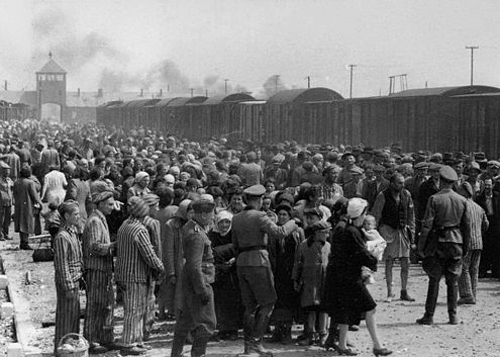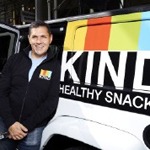
A Role for Tikkun Olam in Business
By Daniel Lubetzky

NEW YORK — In this day and age, doing well and doing good are not mutually exclusive. Although the concept of tikkun olam is rooted in Jewish texts and traditions, its importance and application transcend the Jewish community and can be applied to achieve change in the world at large.
Every fall, during the holiday period, I find myself re-reflecting on the meaning behind a message from Rabbi Hillel I have across from my desk at work. “In a place where there is no humanity,” he wrote, “strive thou to be human.” These words serve as a reminder of my father, and the sense of compassion he instilled in me and my three siblings. He taught us that kindness and empathy are the foundations on which humanity will stand or fall. For this reason, and many others, he was my mentor, best friend, hero, and also one of the inspirations for KIND – the brand I conceived 12 years ago.
But before he was any of these things, my dad was a nine-year-old boy who had to live through one of the darkest periods in human history. When World War II started, my father was living with his parents and his 14-year-old brother in Kovno, Lithuania. The 40,000 Jews of Kovno were herded into ghettos and kept under horrible and humiliating conditions; those who survived were then shipped off to concentration camps. Just before the Nazis left Lithuania in 1944, they loaded many of the camp’s prisoners, including my family, onto cattle cars to Germany. At some point, my grandmother, along with the other women, was taken off the train, with no chance to say goodbye to her husband and sons. My father, his brother and my grandfather were sent to Dachau, where they were left to starve in subhuman conditions and forced into slave labor.
But, as evidenced by my father’s experiences at Dachau, the human spirit shows itself even amidst the worst circumstances. My father never forgot a German soldier who risked serious punishment by throwing a rotten potato at my dad’s feet when others were not watching, providing him the sustenance to endure and offering him a glimpse of humanity in the midst of such darkness. My dad always said that potato – that fleeting moment of kindness – helped him stay alive. He was eventually liberated by American soldiers, and, after recuperating, moved to Mexico. There, and when we eventually moved to America, he lived a life rooted in kindness and optimism. He never let his Holocaust experiences embitter him – instead, he maintained a positive outlook and warm demeanor toward others, even as he made sure to remember the many that did not survive, so that we may never forget, and never again permit such atrocities to befall others. In looking back, it’s clear that compassion lay at the heart of my dad’s essence; his entire story was a string of kindnesses.
When we look for it, we see the transformative power of kindness around us, too. Small acts of kindness are happening everywhere, all the time, each one contributing toward shared efforts of tikkun olam, or repairing the world. Collectively, these acts of kindness – both big and small – make this world a better, more tolerant place to live. The more willing we all are to step out of our comfort zones and engage in these acts, showing respect for others’ differences in the process, the more we will come to recognize and celebrate our shared humanity. I have found that a more conscious focus on kindness can also significantly impact the communities in which we live and work.
How we work to repair the world, however, changes depending on the environment and tools available to us. In the 15th century, the church was the organizing institution in society. With the rise of the nation-state in the centuries that followed, power shifted to the government. And since the Industrial Revolution, capitalism, market and business forces have increasingly permeated our lives and dominated as the primary drivers in society. As such, we need to leverage those market forces in our efforts to repair the world.
In creating KIND, I drew on the principles of tikkun olam in a 21st century environment. Despite early setbacks (of which there were many), I never lost faith in my commitment to developing KIND as a “not-only-for-profit” business that sells healthy and tasty products while also doing its small part to positively impact society. I started my first “not-only-for-profit,” PeaceWorks, in 1994 to foster joint ventures among neighbors striving to co-exist in conflict regions. Today, PeaceWorks continues to encourage business partnerships among Israelis, Egyptians, Jordanians, Palestinians and Turks to shatter cultural stereotypes and forge vested interests in long-term peaceful relations. At KIND, we have a different model, but a similar intention. Our social mission, known as the KIND Movement, is to spread and inspire kindness in the world, and it has been part of our DNA since 2004. Since then, we’ve strived to balance our commercial objectives with our social goals so that they support and reinforce one another. This effort hasn’t been devoid of challenges, and the business has definitely scaled faster than our social mission, but we’re now focused on helping the latter catch up. The hope is to leverage our success to help make the world a little bit kinder, and to empower those in our community to do the same.
As I reflect on the past 12 years, I realize how fortunate I am to have the opportunity to honor my dad’s memory and carry out his legacy every day. Though he passed away in January 2003, I was inspired by the lessons he left behind to conceive KIND in his honor. These same lessons have made me increasingly and acutely aware of our shared responsibility, as human beings, to leave this world a better place than we found it.
*
Daniel Lubetzky is the CEO and founder of KIND Snacks and author of the New York Times best seller Do The Kind Thing. This article originally appeared in the Los Angeles Jewish Journal.
Thank you so much for this fascinating and personal story. It is because of people like you, and your forebears, that Jews are known for tzeddakah and compassion.
Thank you for a beautiful story. I’m inspired and grateful,
–Eva Trieger, Solana Beach, California